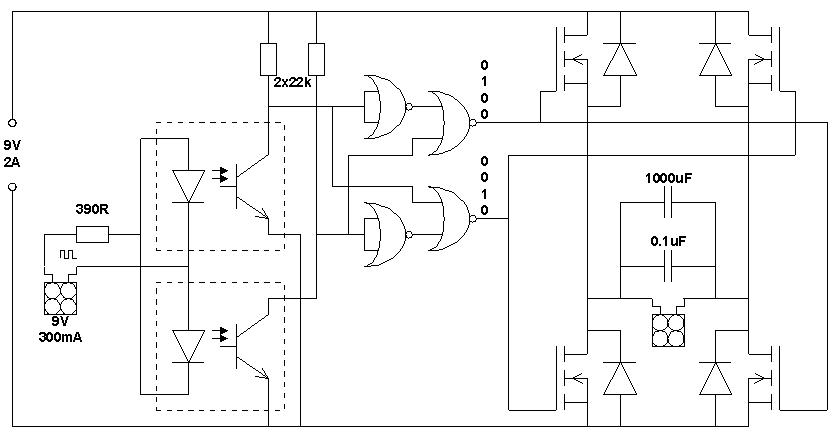| |
In lugnet.robotics, Mark Riley wrote:
| |
I’ve crossposted to .trains because this will be useful for those wanting to
run LDCC with an RCX 2.
Hi All,
...
For trainheads interested in using this with LDCC: As an experiment, by
temporarily shorting one or two of the diodes (on the 12V path) with a small
piece of wire, you can get a higher track voltage. I felt safe trying this
out because the nominal voltage rating for the RCX H-bridges is 12V (max is
16V), other analog components should be able to handle an extra volt or two,
and the CPU and RAM are supplied by a 5V regulator. Anyways, with the higher
track voltage the locomotives were much zippier, however, I’ve only tested
this for a little while so proceed with caution if you’d like to try this out
yourself.
Mark
|
On a closely related topic, here’s a circuit diagram for an RCX output booster.
Put one of these on each RCX output that you want to use to drive a train or a
more powerful motor (RCC motor?)

The circuit will control a higher power device with RCX variable speed control.
The input from the RCX is opto-isolated. This keeps the RCX output current low
and prevents any high power getting back to the RCX and damaging it. I’ve shown
9V 2A as the high power supply, since that’s what I intend to use for my trains,
but you should be able to use any supply if you get components of the right
ratings. The NOR gates are CMOS-compatible, so they’re limited to 15 Volts, but
you can always drop extra volts with diodes.
The large capacitor on the output is to turn the PWM of the RCX into smoother
power for the train motors. Remove it if you’re using LDCC as you don’t want to
smooth out the control signals.
My Pendolino, with four train motors, pulls 1 Amp at 7-8 Volts, so you can run
at least 10 train motors with a 3 Amp power supply with this circuit, making it
ideal for those triple headers with two helpers in the middle!
Connect the input to an RCX output and the output to one or more feed wires
(more for higher current). Connect a regulated 9V PSU to the power input. I’ll
use a dual 30V 3A supply (set to 9V) for two circuits driving two tracks. You
should be able to use a higher voltage for LDCC.
The output of this circuit will not float, since the protection diodes will
short the motor overrun through the power supply. Apart from that, the output
should be a high power version of the input.
Using MOSFETS means that there will be a small voltage drop that is proportional
to the current drawn. This helps prevent thermal runaway but means that for
high current applications you should experiment to find the best supply voltage.
I suggest using MOSFETs with an ON resistance of 10 milliohms or so, in a TO220
package since they’re easier to mount than a TO3. It might be convenient to
attach all four MOSFETs to a piece of aluminium via mica washers.
N.B. This circuit is a prototype and has not been tested, so I cannot accept any
responsibility for accidents or damage to anything you connect to it!
I intend to get some components and test it as soon as time permits. It should
mean I can control train speed with the RCX remote control - useful at
exhibitions!
Mark
|
|
Message is in Reply To:
 | | RCX 2.0 Power Supply
|
| I've crossposted to .trains because this will be useful for those wanting to run LDCC with an RCX 2. Hi All, I've posted some photos on Brickshelf of an external power supply for the RCX 2. The nice part about the design is that program memory is (...) (20 years ago, 15-Sep-04, to lugnet.robotics, lugnet.trains, FTX)
|
10 Messages in This Thread:
    
        
      
  
- Entire Thread on One Page:
- Nested:
All | Brief | Compact | Dots
Linear:
All | Brief | Compact
|
|
|
|